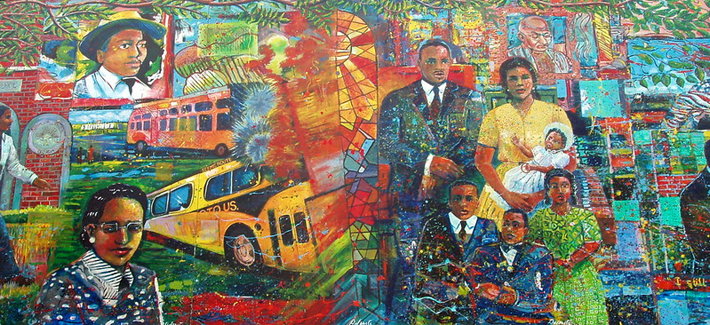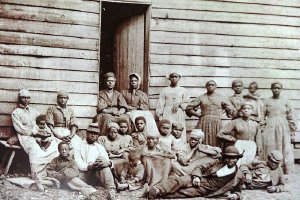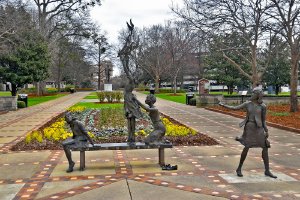Eight years before Martin Luther King Jr. delivered his famous speech where he shared his dream for America, that dream was born in the city of Montgomery, Alabama. As we end our tribute to Black History Month 2021, we explore the roots of the movement and its relevance to America today.

Addressing more than 250,000 gathered on the Washington Mall August 28, 1963, Dr. King shared his vision: “that one day this nation will rise up and live out the true meaning of its creed: ‘We hold these truths to be self-evident: that all men are created equal.’”
King was propelled into national prominence as a driving force and the voice of the civil rights movement by a simple act of defiance on Thursday, December 1, 1955. That was the day a Black woman named Rosa Parks was arrested for refusing to give up her seat on a Montgomery, Alabama, bus so white passengers could sit down.
E.D. Nixon, former head of the Montgomery branch of the National Association of Colored People, secured Parks’ release from jail and gained her agreement to use her arrest to challenge the city’s Jim Crow laws. The Women’s Political Council of Montgomery issued a pamphlet calling for a strike the following Monday: all Black people were asked to boycott the Montgomery bus system that day.
With Black commuters comprising some 75 percent of those using Montgomery buses, the city depended on their patronage to pay for its operation. Monday, December 5, 90 percent of the Black community boycotted the bus company. Black religious and community leaders voted to extend the boycott to force the issue. They formed the Montgomery Improvement Association and chose a 26-year-old minister from Atlanta who had just taken over as pastor of Montgomery’s Dexter Avenue Baptist Church the year before to be president of the association. His name was Martin Luther King Jr.
For 381 days, the boycott continued, prompting reprisals including the bombing of the homes of Dr. King and other leaders of the movement: E. D. Nixon, Rev. Ralph Abernathy, pastor of the First Baptist Church in Montgomery, and Rev. Robert Graetz, pastor of Trinity Lutheran Church.
In February 1956, the Montgomery County Grand Jury indicted King for his role in the boycott of the Montgomery City Lines, Inc. He stood trial, was convicted, and was ordered to pay a $500 fine and $500 in court costs.
Aurelia S. Browder, another woman arrested for refusing to give up her seat on a Montgomery bus, had filed suit. A district court ruled that the statute authorizing segregation on the city’s buses was unconstitutional.
On November 13, 1956, while King was in the courtroom on trial for leading the boycott, he learned that the U.S. Supreme Court affirmed the District Court’s decision in Browder v. Gayle. That decision was challenged by the city and state but on December 17, the Supreme Court rejected the appeals and confirmed their decision.
Three days later, the order to integrate Montgomery buses arrived in the city and the boycott was ended.
To continue the momentum of the Montgomery boycott, in January 1957, King called a meeting in Atlanta of Black ministers and other leaders of the civil rights movement at the Ebenezer Baptist Church. The result of that meeting was the founding of the Southern Christian Leadership Conference.
In the SCLC Manifesto, they wrote, “The church has the high task to provide the American people with moral leadership. And while the major denominations have spoken out clearly for brotherhood, the task of many local churches is made more difficult by the moral compromise in part imposed upon them by the civil rights conflict.”
They further asserted their embracing of nonviolent civil disobedience to create social change, calling on Black people of America “to accept Christian Love in full knowledge of its power to defy evil. We call upon them to understand that non-violence is not a symbol of weakness or cowardice, but as Jesus demonstrated, non-violent resistance transforms weakness into strength and heeds courage in face of danger. We urge them, no matter how great the provocation, to dedicate themselves to this motto: ‘Not one hair of one head of one white person shall be harmed.’
“We advocate non-violence in words, thought and deed, we believe this spirit and this spirit alone can overcome the decades of mutual fear and suspicion that have infested and poisoned our Southern culture.”
On this final day of Black History Month 2021, after a year of civil unrest, social upheaval, and polarization in the midst of a global pandemic, the words of Dr. King from his 1958 book, Stride Toward Freedom: The Montgomery Story, still resonate as a model for the religious community to bring about positive social change.
“The mere fact that we live in the United States means that we are caught in a network of inescapable mutuality. Therefore, no American can afford to be apathetic about the problem of racial justice. It is a problem that meets every man at his front door.
“The racial problem will be solved in America to the degree that every American considers himself personally confronted with it. Whether one lives in the heart of the Deep South or on the periphery of the North, the problem of injustice is his problem; it is his problem because it is America’s problem.”
_____________
The Church of Scientology publishes this blog to help create a better understanding of the freedom of religion and belief and provide news on religious freedom and issues affecting this freedom around the world.
The Founder of the Scientology religion is L. Ron Hubbard and Mr. David Miscavige is the religion’s ecclesiastical leader.
For more information, visit the Scientology website or the Scientology TV network.


